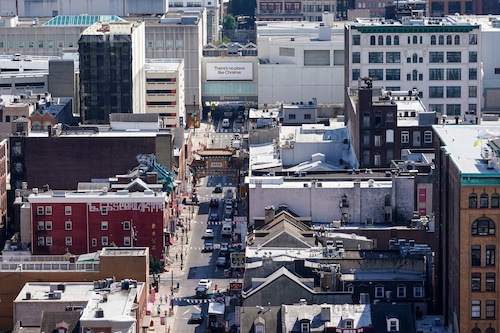The city of Philadelphia The $1.3 billion downtown arena proposed by the Philadelphia 76ers was approved by the city council on Thursday, despite strong resistance from activists and residents of nearby Chinatown.
At a crowded meeting at City Hall, the council approved the project by a vote of 12 to 5. The NBA team’s owners intend to move into 76 Place by 2031. Opponents counter that the battle is far from finished.
According to The Philadelphia Inquirer, Mayor Cherelle Parker, a Democrat who had supported the initiative, claimed that the entire city would gain from what she described as a historic, game-changing economic development project.
Advocates are hopeful that the 18,500-seat stadium will help revitalize Market East, a run-down shopping district that connects City Hall and the Liberty Bell. Despite numerous attempts at regeneration, the region has suffered for years.
The owners of the team, Harris Blitzer Sports & Entertainment, are keen to terminate their lease with Comcast Spectacor at the Wells Fargo Center in South Philadelphia. In order to reach their desired opening date, they have pushed for city approval before the end of the year.
While they are allowed to look for state and federal assistance, they promised not to request any construction cash from the city. They would pay roughly $6 million a year in Payments in Lieu of Taxes rather than property taxes.
Protesters vowed to keep fighting after locking arms on the council floor and postponing the start of Thursday’s meeting.
According to Mohan Seshadri, an opponent and member of the No Arena Coalition who is also the executive director of the Asian Pacific Islander Political Alliance, the mayor and City Council acquiesced to the billionaires’ fabricated timeframe.
At a public meeting hosted by the Sixers on November 16 in Center City, co-owner and chief arena developer David Adelman shares his ideas for a new Sixers venue.TNS
The arena’s detractors worry that it will cause traffic jams on game days and darkness at other times, as well as gentrification and increased rents in the neighborhood.
Since the 1960s, the Chinatown community has opposed a number of proposed constructions, including a freeway, a baseball stadium, a prison, and casinos. The most recent of them, which opened in 1991, completely destroyed the area.
In order to meet the 76ers’ plan, council members approved 11 bills on Thursday that deal with zoning amendments, land transfers, public safety, and other issues.
More sports news
Note: Every piece of content is rigorously reviewed by our team of experienced writers and editors to ensure its accuracy. Our writers use credible sources and adhere to strict fact-checking protocols to verify all claims and data before publication. If an error is identified, we promptly correct it and strive for transparency in all updates, feel free to reach out to us via email. We appreciate your trust and support!

